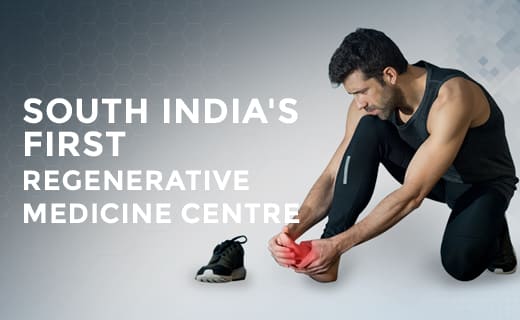Knee pain can be debilitating, affecting your daily activities and quality of life. If you’ve been struggling with chronic knee pain, you may be exploring various treatment options. One promising avenue is regenerative medicine. But is it right for you? In this guide, we’ll explore what regenerative medicine entails, its benefits, potential risks, and whether it might be the solution you’re looking for.

What is Regenerative Medicine?
Regenerative medicine is a groundbreaking field that focuses on repairing, replacing, or regenerating damaged tissues and organs. It utilises the body’s natural healing processes to restore function and alleviate pain. Common regenerative treatments for knee pain include
- Platelet-Rich Plasma (PRP) Therapy: This involves extracting a sample of your blood, processing it to concentrate the platelets, and injecting it into the knee joint to promote healing.
- Stem Cell Therapy: Stem cells, harvested from your own body (usually from bone marrow or fat), are injected into the damaged area to stimulate tissue regeneration.
- Tissue Engineering: This involves using biological materials to promote the healing of injured tissues.
Benefits of Regenerative Medicine for Knee Pain
- 1. Repair damaged tissues, reduce inflammation, and restore mobility without surgery so you can skip the risks of surgery.
- 2. Natural Healing: Regenerative treatments harness your body’s own healing mechanisms, potentially leading to long-lasting results.
- 3. Reduced Pain and Inflammation: Many patients experience significant pain relief and decreased inflammation after undergoing regenerative therapies.
- 4. Improved Functionality: Many patients report improved mobility and functionality, allowing them to return to their daily activities more comfortably.
Is Regenerative Medicine Right for You?
Determining if regenerative medicine is the right option for your knee pain involves considering several factors:
- Diagnosis: Consult with a healthcare professional to diagnose the underlying cause of your knee pain. Conditions such as osteoarthritis, tendonitis, or ligament injuries may benefit from regenerative therapies.
- Severity of Pain: Evaluate your pain level and how it affects your quality of life. Regenerative medicine is often most effective for patients with moderate to severe knee pain who have not found relief through conservative treatments.
- Previous Treatments: Consider your history with other treatments. If traditional options like physical therapy, anti-inflammatory medications, or corticosteroid injections have not provided relief, regenerative medicine might be worth exploring.
- Personal Health: Your overall health and medical history will play a crucial role in determining your candidacy for regenerative treatments. Certain medical conditions may contraindicate these therapies
Consultation and Next Steps
If you’re considering regenerative medicine for knee pain, the first step is to schedule a consultation with a qualified healthcare provider who specialises in this field. During the consultation, you’ll discuss your symptoms, medical history, and treatment goals. The provider will perform a thorough examination and may recommend imaging tests to assess the condition of your knee.
Regenerative medicine offers a promising alternative for those seeking relief from knee pain, especially when traditional methods have failed. By leveraging your body’s innate healing capabilities, these innovative treatments can lead to improved function and a better quality of life. However, it’s essential to work closely with a healthcare professional to determine the best approach tailored to your specific needs.
If you’re ready to explore regenerative medicine for knee pain relief, reach out to us today to schedule your consultation and take the first step toward a pain-free life!










